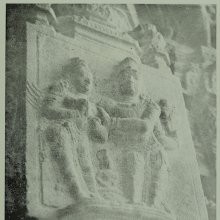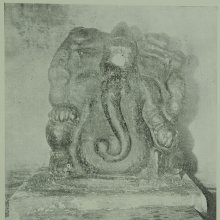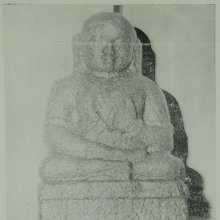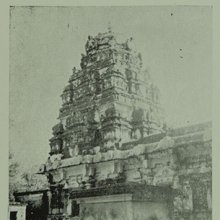Ciṇṇa, Cinna, Ciṉṉa: 11 definitions
Introduction:
Ciṇṇa means something in Hinduism, Sanskrit, Buddhism, Pali, the history of ancient India, Jainism, Prakrit, Tamil. If you want to know the exact meaning, history, etymology or English translation of this term then check out the descriptions on this page. Add your comment or reference to a book if you want to contribute to this summary article.
Alternative spellings of this word include Chinna.
Images (photo gallery)
(+3 more images available)
India history and geography
Source: Cologne Digital Sanskrit Dictionaries: Indian Epigraphical GlossaryCinna.—(EI 3; SITI), name of a coin; sometimes regarded as a fanam (CITD); also spelt sinna in Telugu; a weight equal to (1/30) of a tola and called a Canteroy fanam; one-eighth part of a coin called pagoda; the weight of 4 guri-giñjas. Note: cinna is defined in the “Indian epigraphical glossary” as it can be found on ancient inscriptions commonly written in Sanskrit, Prakrit or Dravidian languages.
--- OR ---
Cinna.—also spelt sinna; same as fanam (q. v.); (1/8) of a pagoda (q. v.) Note: cinna is defined in the “Indian epigraphical glossary” as it can be found on ancient inscriptions commonly written in Sanskrit, Prakrit or Dravidian languages.

The history of India traces the identification of countries, villages, towns and other regions of India, as well as mythology, zoology, royal dynasties, rulers, tribes, local festivities and traditions and regional languages. Ancient India enjoyed religious freedom and encourages the path of Dharma, a concept common to Buddhism, Hinduism, and Jainism.
Languages of India and abroad
Pali-English dictionary
Source: BuddhaSasana: Concise Pali-English Dictionaryciṇṇa : (pp. of cināti) practised; made a habit of; accomplished.
Source: Sutta: The Pali Text Society's Pali-English DictionaryCiṇṇa, (pp. of carati) travelled over, resorted to, made a habit of; done, performed, practised J.III, 541; Miln.360.—su° well performed, accomplished S.I, 42=214=Sn.181; Pv III, 56.—Cp. ā°, pari°, vi°.

Pali is the language of the Tipiṭaka, which is the sacred canon of Theravāda Buddhism and contains much of the Buddha’s speech. Closeley related to Sanskrit, both languages are used interchangeably between religions.
Sanskrit dictionary
Source: DDSA: The practical Sanskrit-English dictionaryCinna (चिन्न).—Name of a very small grain.
Derivable forms: cinnaḥ (चिन्नः).
Source: Cologne Digital Sanskrit Dictionaries: Shabda-Sagara Sanskrit-English DictionaryCinna (चिन्न).—m.
(-nnaḥ) A kind of grain, (Panicum miliaceum.) A various reading of cīna, q. v.
Source: Cologne Digital Sanskrit Dictionaries: Monier-Williams Sanskrit-English DictionaryCinna (चिन्न):—m. for cīna q.v., [cf. Lexicographers, esp. such as amarasiṃha, halāyudha, hemacandra, etc.]
Source: Cologne Digital Sanskrit Dictionaries: Yates Sanskrit-English DictionaryCinna (चिन्न):—(nnaḥ) 1. m. A kind of grain.
[Sanskrit to German]
Sanskrit, also spelled संस्कृतम् (saṃskṛtam), is an ancient language of India commonly seen as the grandmother of the Indo-European language family (even English!). Closely allied with Prakrit and Pali, Sanskrit is more exhaustive in both grammar and terms and has the most extensive collection of literature in the world, greatly surpassing its sister-languages Greek and Latin.
Prakrit-English dictionary
Source: DDSA: Paia-sadda-mahannavo; a comprehensive Prakrit Hindi dictionaryCiṇṇa (चिण्ण) in the Prakrit language is related to the Sanskrit word: Cīrṇa.
Prakrit is an ancient language closely associated with both Pali and Sanskrit. Jain literature is often composed in this language or sub-dialects, such as the Agamas and their commentaries which are written in Ardhamagadhi and Maharashtri Prakrit. The earliest extant texts can be dated to as early as the 4th century BCE although core portions might be older.
Kannada-English dictionary
Source: Alar: Kannada-English corpusCiṇṇa (ಚಿಣ್ಣ):—[adjective] of limited size; of comparatively restricted dimensions; not big; little; small.
--- OR ---
Ciṇṇa (ಚಿಣ್ಣ):—
1) [noun] that which is small in size; a little thing.
2) [noun] a male child; a boy.
--- OR ---
Cinna (ಚಿನ್ನ):—
1) [noun] 'a precious yellow metallic element, highly malleable and ductile, and not subject to oxidation or corrosion (Symbol: Au); gold.'2) [noun] a monetary coin made of gold; a gold coin.
3) [noun] a term of endearment used to call children, one’s sweetheart, etc.; (as) 'love', 'my love' or 'darling'.
4) [noun] (fig.) a person of unblemished merit.
5) [noun] ಚಿನ್ನದ ಎಳೆ [cinnada ele] cinnada eḷe a thin wire of wire, used in making ornaments or in textiles; ಚಿನ್ನದ ಗಣಿ [cinnada gani] cinnada gaṇi (fig.) a place, position, authority which provides ample opportunity to get information, income, etc.; 2. (fig.) a generous, magnanimous person; ಚಿನ್ನದ ಹಬ್ಬ [cinnada habba] cinnada habba golden jubilee the fiftieth anniversary; b) a celebration of this; ಚಿನ್ನದ ತೊಟ್ಟಿಲಲ್ಲಿ ಹುಟ್ಟಿರು [cinnada tottilalli huttiru] cinnada toṭṭilalli huṭṭiru (fig) to be affluent since one’s birth; ಚಿನ್ನದ ಸೂಜಿ ಎಂದು ಕಣ್ಣು ಚುಚ್ಚಿಕೊ [cinnada suji emdu kannu cucciko] cinnada sūji endu kaṇṇu cucciko (prov.) pain inflicted by a person however dear to oneself, is still a pain; fetters even of gold are heavy; ಚಿನ್ನ ಹಿಡಿದರೂ ಮಣ್ಣಾಗು [cinna hididaru mannagu] cinna hiḍidarū maṇṇāgu to be very unlucky.
--- OR ---
Cinna (ಚಿನ್ನ):—[adjective] of limited size; of comparatively restricted dimensions; not big; little; small.
--- OR ---
Cinna (ಚಿನ್ನ):—
1) [noun] that which is small in size; a little thing.
2) [noun] a male child; a boy.
--- OR ---
Cinna (ಚಿನ್ನ):—[noun] that which cut, severed (off from a whole).
--- OR ---
Cinna (ಚಿನ್ನ):—[noun] = ಚಿನ್ನೆ [cinne].
Kannada is a Dravidian language (as opposed to the Indo-European language family) mainly spoken in the southwestern region of India.
See also (Relevant definitions)
Full-text (+42): Cinnaka, Cinna arundinacea, Cina, Adda-cinna, Cinnaccati, Cinna botuku, Cinnaccalavatai, Cinna latifolia, Stout woodreed, Wood-reed, Sweet woodreed, Cinna eachala, Bogada cinna, Cinnamuttu, Cinnagras, Drooping woodreed, Ciṇṇatta, Sweet reed grass, Cirna, Cinnappanam.
Relevant text
Search found 9 books and stories containing Ciṇṇa, Cinna, Ciṉṉa; (plurals include: Ciṇṇas, Cinnas, Ciṉṉas). You can also click to the full overview containing English textual excerpts. Below are direct links for the most relevant articles:
A Note on Julius Caesar < [April - June 1973]
Manusmriti with the Commentary of Medhatithi (by Ganganatha Jha)
Verse 8.355 < [Section XLVI - Adultery]
Verse 10.126 < [Section XIV - Sources of Income (vittāgama)]
Vinaya (3): The Cullavagga (by T. W. Rhys Davids)
Cullavagga, Khandaka 2, Chapter 3 < [Khandaka 2 - Probation and Penance (A)]
The validity of Anumana (inference) in Nyaya system (by Babu C. D)
Hindu Pluralism (by Elaine M. Fisher)
The sites of Multilingual Literary production in Nāyaka-period South India < [Chapter 4 - The Language Games of Śiva]
The invention of the Sthalapurāṇa of Madurai < [Chapter 4 - The Language Games of Śiva]
Sushruta Samhita, Volume 6: Uttara-tantra (by Kaviraj Kunja Lal Bhishagratna)
Chapter LI - Symptoms and Treatment of Asthma (Shvasa) < [Canto III - Kaya-chikitsa-tantra (internal medicine)]





